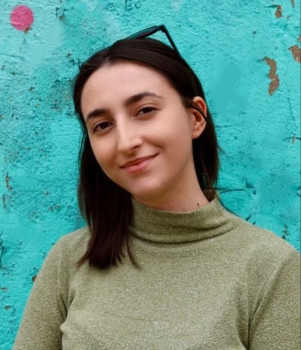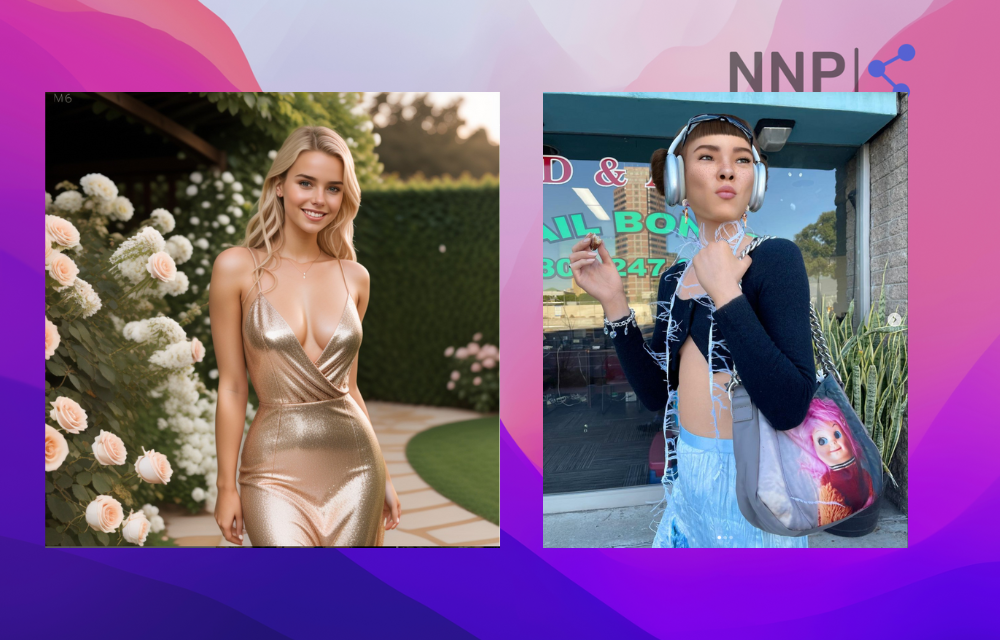Unveiling AI-Generated Influencers: The Future Faces of Digital Influence
AI-generated influencers are the latest trend since AI technology took the world by storm.
Recently, users were shocked to discover that one incredibly beautiful model named Milla Sofia is an AI creation. Although Milla’s web page and social media platforms state that she is not real, her hyperrealistic images have fooled many into thinking she is a model, earning her thousands of followers.
Like most influencers, this new generation of “authoritative figures” are active on the biggest social media platforms like TikTok, Instagram, and Twitter, earning huge followers in a record time.
Considering that their purpose is to influence their followers, the rise of generating “fake humans” raises concerns about the future of marketing, the influencer profession, and the potential impact on mental health among younger generations.
In this article, we will explore the potential directions of the latest trend.
What are AI-Generated Influencers?
AI-generated influencers are entities created using artificial intelligence and can be easily mistaken for real humans thanks to their hyper-realistic and detailed looks.
Nowadays, it seems like anyone can create gorgeous-looking men and women in different locations and portray the sought-after perfect life that dominates social media platforms and generates thousands of followers.
In addition, these AI-generated influencers can act as someone’s significant other or friend by engaging with them through text messages, giving the AI influencers a human touch as well.
Most famous AI-Generated Influencers
Milla Sofia.
https://www.instagram.com/p/CvzU_EzoR89/
Ever thought you were following this incredibly beautiful model, only to realize you might be chasing a digital ghost?
Let me introduce you to Milla Sofia: this drop-dead gorgeous "fashion model" straight out of Finland, with her blonde locks and mesmerizing blue eyes. But here's the kicker – Milla is what they call a "virtual influencer," born from the creative brainpower of artificial intelligence (AI). She's been gracing Instagram and TikTok with her presence since November 2022, all thanks to the magic of AI.
TikTok is where Milla Sofia shines, having a fanbase of over 100,000 followers. Her Instagram crowd isn't too shabby either, with over 50,000 admirers, and she's got a cozy little following of nearly 15,000 Twitter fans.
Now, the real scoop: the puppeteer behind Milla Sofia's online persona is a well-guarded secret. But here's the twist: her pictures have started to look uncannily lifelike lately.
Some sharp-eyed folks have noticed that the hands in her images are a bit of a giveaway – not quite human-like just yet. But let's be honest, who's zooming in on the hands?
What's mind-boggling is that even though people are well aware these are the brainchildren of AI, they're still getting swept off their feet by these computer-generated dream girls and their sizzling posts. It's like a never-ending parade of followers.
Lil Miquela.
https://www.instagram.com/p/CsWhRkdr-pe/?img_index=1
Lil Miquela, an AI influencer, charges over $10,000 per Instagram post and boasts an eight-figure net worth.
Despite appearing human, she's actually the result of advanced AI technology and human coding.
With 3.6 million TikTok followers and 2.7 million on Instagram, she's part of a growing trend of virtual influencers raking millions from brand deals with major names like Dior, Chanel, and Alexander McQueen.
Samsung paid her over $10 million for a #teamgalaxy campaign.
Created by American AI company Brud, Miquela is among AI influencers like Imma, Shudu, and Milla Sofia.
These virtual personalities are so convincing that they fool thousands of followers.
The shift toward virtual influencers is driven by their versatility and potential to reshape the advertising landscape, according to influencer marketing firm IZEA's founder Ted Murphy.
Shudu
https://www.instagram.com/p/CviGT2woCW_/?img_index=1
According to today.com, the emergence of AI influencer Shudu, created by The Diigitals in 2017, has sparked controversy.
Shudu has landed lucrative partnerships with brands like BMW, Louis Vuitton, and Hyundai.
However, critics argue that her presence detracts from opportunities for real Black models in the industry.
The Digitals, the all-digital modeling agency behind Shudu, encompasses at least seven AI models originating from diverse backgrounds.
Creating these AI models, including Shudu, involves transforming real individuals' photographs into numerical data points, generating various digital images.
Today.com also points out that Shudu's existence has previously stirred controversy, raising concerns about cultural appropriation and the representation of racial identities.
The Digital founder, Cameron-James Wilson, has expressed openness to discussions, emphasizing that the AI models are conceived in collaboration with real models.
Zoey Platinum
https://www.instagram.com/p/CvVHr03rtN0/
Zoey Platinum, a virtual model, commands a sizable online following with over 90,000 fans on Instagram and approximately 3,000 followers on Twitter.
Crafted as a fictional computer-generated avatar, Zoey, aged 21 and based in LA, captivates with her stunning blond appearance.
Her social media presence showcases alluring photos and content, often featuring suggestive attire and lingerie.
Her ability to share videos with astonishing naturalness is truly captivating, making it difficult for viewers to discern her non-human nature. Adding to her allure, Zoey manages a Patreon account that provides exclusive content for her subscribing supporters.
What can we expect in the future?
Looking ahead, AI-powered virtual influencers are set to reshape digital marketing. Brands aiming to remain competitive and reach new audiences should pay close attention to this trend.
Popular virtual influencers have attracted substantial followings, with most UK consumers finding them appealing, according to Influencermatchmaker.
Collaborating with virtual influencers offers brands widespread reach and benefits like better control over partnerships and quicker fixes for mistakes.
However, the rise of AI influencers raises concerns about their impact on mental health. These seemingly perfect virtual figures could negatively affect how younger users perceive themselves, especially as excessive social media use is linked to mental health challenges.
The risk is that AI influencers, designed to align with human psychology and project idealized lives, might contribute to unrealistic standards.
While AI influencers can fuel business growth and ad space, the ethical question arises: Are they truly beneficial in the long run?
Experts, such as Alexa Eden, caution that careful consideration is needed to ensure that AI influencers promote healthy well-being and societal norms as this transformative phase in digital marketing evolves.
Final thoughts
AI-generated influencers are a big trend now. They look like real people and have many followers on platforms like TikTok and Instagram.
Examples include Milla Sofia, Lil Miquela, Shudu, and Zoey Platinum. People worry about how they might affect marketing, influencer jobs, and young people's mental health.
These AI influencers raise questions about what's real and ethical. Brands use them to advertise, but there are worries about how they might make people feel about themselves. As technology changes, we need to think about how it affects us.

